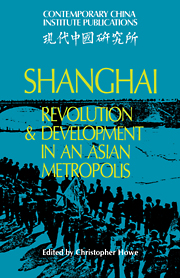Book contents
- Frontmatter
- Contents
- List of illustrations
- Preface
- Foreword
- Abbreviations
- PART ONE THE MODERN HISTORICAL PERSPECTIVE
- PART TWO POLITICAL LIFE
- PART THREE ECONOMIC DEVELOPMENT AND LIVING-STANDARDS
- PART FOUR THE SUBURBAN TRANSFORMATION
- PART FIVE CULTURE AND IDEOLOGY
- Notes
- A chronology of modern Shanghai, 1842–1979
- Contributors
- Index
Foreword
Published online by Cambridge University Press: 14 October 2009
- Frontmatter
- Contents
- List of illustrations
- Preface
- Foreword
- Abbreviations
- PART ONE THE MODERN HISTORICAL PERSPECTIVE
- PART TWO POLITICAL LIFE
- PART THREE ECONOMIC DEVELOPMENT AND LIVING-STANDARDS
- PART FOUR THE SUBURBAN TRANSFORMATION
- PART FIVE CULTURE AND IDEOLOGY
- Notes
- A chronology of modern Shanghai, 1842–1979
- Contributors
- Index
Summary
Why select Shanghai as the window through which to look at the new China? One of the world's largest cities can hardly be considered ‘average’ or ‘typical’, and no Sinological sociologist in search of the Chinese equivalent of the Lynds's ‘Middletown’, Warner's ‘Yankee city’ or Hunter's ‘Regional City’ would settle for Shanghai. The reason for choosing Shanghai, aside from its intrinsic historical interest, is that the city is not average but critical – critical in the sense that serious analysis of nearly all of the important aspects of life in China must, eventually, confront Shanghai and its special place in the Chinese scheme of things.
Whether the subject is heavy industries, such as steel or petrochemicals; or light industries, such as textiles or electronics, Shanghai commands attention. Shanghai's political significance in the history of revolutionary China reaches from the founding of the Chinese Communist Party there to the more recent dramatics associated with the Gang of Four. If the subject is learning, be it scientific and technological or cultural and artistic, Shanghai cannot be ignored, for its educational system is the most diversified and its middle schools the most comprehensive in all China. It goes without saying that any study of Chinese urban matters must deal extensively with that country's largest city, but it is equally true that the special districts of the Shanghai periphery illustrate the best of China's suburban planning, excellent examples of farming, and a wide range of rural industries.
- Type
- Chapter
- Information
- ShanghaiRevolution and Development in an Asian Metropolis, pp. xi - xviPublisher: Cambridge University PressPrint publication year: 1981
- 1
- Cited by

